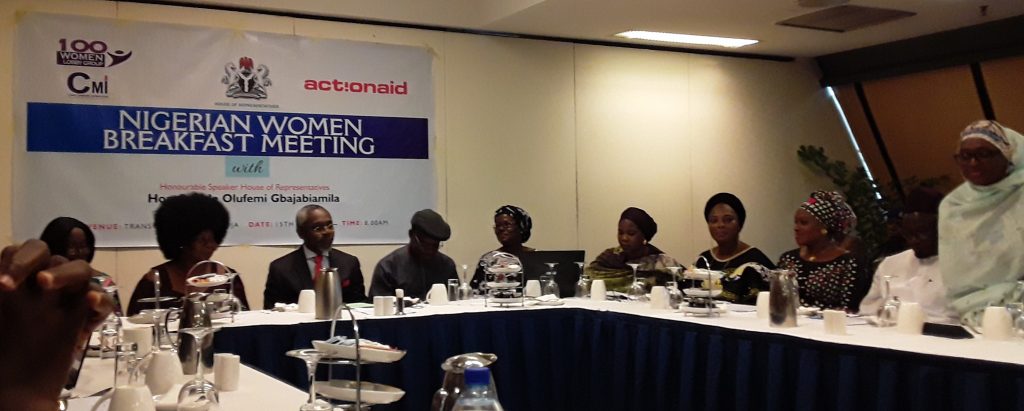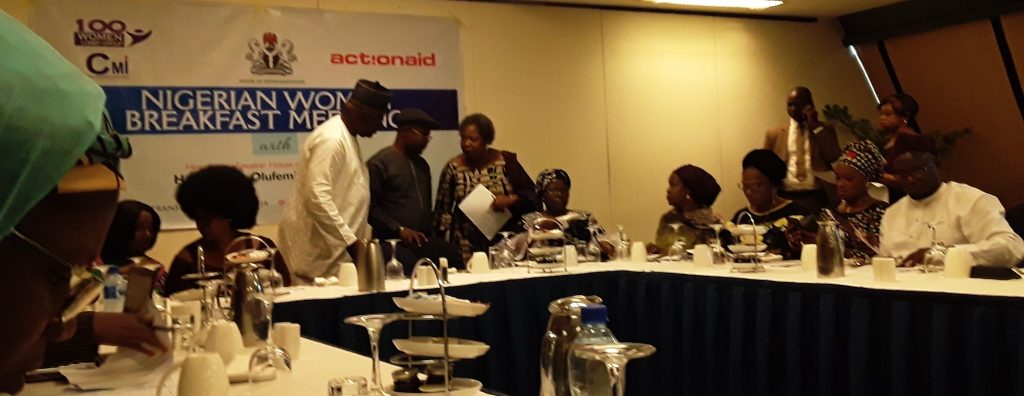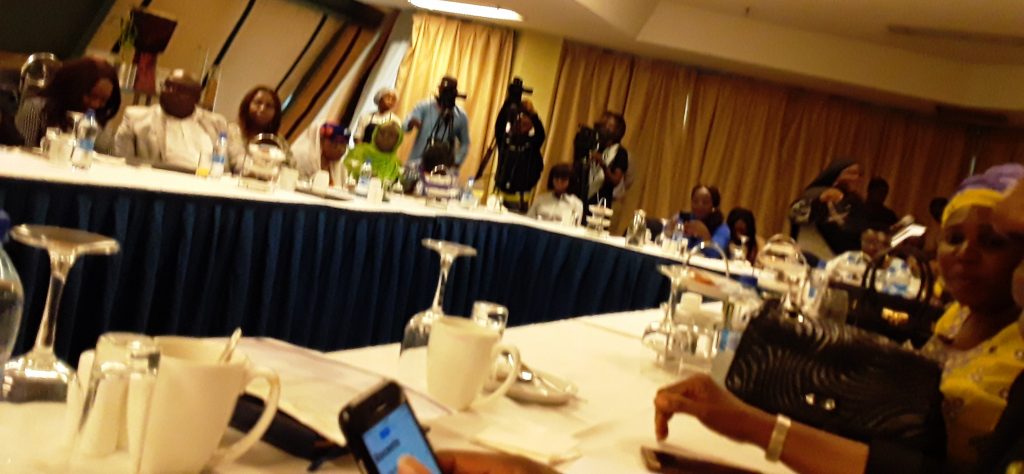NIGERIAN WOMEN DEMAND 50% REPRESENTATION IN MINISTERIAL AND BOARD APPOINTMENTS IN THE CURRENT ADMINISTRATION.
By Lady Nkiru Celine Okoro July 22, 2019
Nigerian women on Monday July 15 2019 in Abuja requested a minimum 50% representation in Ministerial and board appointments in the current administration. This is to make up for their dismal performance in 2019 general elections that saw a sharp drop in female representation in the 9th Federal House of Representatives from 6.5% in 2015 to 3% now.

This demand was made known by the Country Director, Action Aid Nigeria, Mrs. Ene Obi in her welcome address at the first ever breakfast meeting with the Speaker, Federal House of Representatives, Rt. Honourable Olufemi Gbajabiamila with Nigerian Women at Transcorp Hilton Hotel, Abuja.
Other port pouri of demands by Nigerian women in their ten point agenda include:
- Revisiting the Electoral law reform bill 2018, to ensure free, fair, credible and violence elections. Recognizing that the dismal performance of Nigerian women in The 2019 general elections was as a result of high level physical, emotional and psychological violence and assault perpetrated against female contestants such that several months after the elections, the perpetrators are yet to be brought to answer to their crimes.
- Nigerian women also requested that the Gender and Equal Opportunity (GEO) Bill 2016 that did not have the privilege of going through public hearing in the 8th National Assembly should be speedily revisited. The GEO bill provides for a minimum 35% affirmative action in elective and appointive positions for Nigerian women not as a privilege but a necessary antidote to redress several decades of under representation on Nigerian women and persons living with disabilities in governance and public service. The bill seeks to review existing laws, policies and practices that are discriminatory its entirety. It reasons that a situation where half of the population is significantly under represented does not provide for effective sustainable development as a global best practice.
- Closely related to the above is the call for review of the Gender Responsive Public Service Bill 2018 that seeks gender balance in public service in Nigeria. A situation where women represent less than 30% of Nigeria’s public service and most of them occupy low cadre positions is grossly unacceptable.
- Specifically, Nigerian women under auspices of the 100 women lobby group requested for a Special Assistant on Gender in the office of the Honourable Speaker to work with gender focused nongovernmental organizations to identify and articulate discriminatory practices in the Nigerian polity that needs to be urgently addressed.
- Nigerian women further requested from the 9th Federal House of Representative, the review and expansion of the laws establishing the Federal Character Commission to include Federal Character, Gender and Equal Opportunity Commission. This will enable this federal government agency to expand its scope and mandate from ensuring equal states representation in all federal government agencies to ensuring gender balance in recruitments and postings as well. Since this rule was applied to establish more federal government girl’s colleges across the states of the federation to increase female enrollment and admission into unity secondary schools in Nigeria. Women are demanding that these rules be applied to create gender parity across all areas and levels of governance in all the states of the federation according to Mrs. Felicia Onibon, Co-ordinator Nigerian Women 100 Lobby group. She was emphatic and opined that the quota system that has been adopted in Education to bridge the gap between girl child enrollment in federal schools should be expanded so that the federal character commission should be reformed to be known as gender and equal opportunity character commission to redress every sector that has imbalances in it and vice versa.
- They implored the Honourable Speaker to ensure that that the 11 women who made it to the 9th Federal House of Representatives be made Chairmen of grade A committees that include Finance and Budget, Ways and means, Education, Health, Security, Transportation, Custom, Foreign Affairs to mention but a few.
- They requested for the institution of gender responsive budgeting system and in the budget process such that gender is mainstreamed in the budget according to United Nations standards and global best practice. This will build into the overarching need to establish a national blueprint for achieving gender equality and empowerment of women and girls in Nigeria with effective resources allocation for effective integration. Mainstreaming gender in Education and health budgets as well as providing adequate funding of gender desk offices across all federation agencies was identified as critical and urgent by the group.
- They requested for a Special Adviser on Diversity to be replicated at federal, state and local government areas across the 36 states of the federation for inclusivity.
- Nigerian women seeks to see in the 9th Assembly a strengthened Women in Parliament committee and a parliamentary caucus to address the issues of female marginalization in the Nigerian polity and governance space that will reach out and lobby political parties to create spaces for women through legislation for sustainable and long term economic empowerment and access for women especially at the grassroots level.
- Most importantly and as a matter of urgency, Nigerian women desires that Rt. Honourable Olufemi Gbajabiamila as a matter of urgency establish in his office A Gender Impact Assessment of all Constituency projects in the 9th federal House of Representative to monitor the gender dimensions and impact of constituency projects across all the states of the federation.

The Honourable Speaker in responding to Nigerian Women’s ten point Agenda pledged his support to Nigerian women and their concerns. He decried the persisting security challenge in the country especially the menace of Boko Haram insurgents and the negative impact on the lives of Nigerian girls in North East and North West.
The Honourable Speaker about a week ago secured the safe release of six girls at Zamfara and one of them was released pregnant. In over three months of there captivity, these girls were denied access to education, traumatized and used as sex slaves by their abductors nothing that “their lives may never remain the same”. He promised that education and security must be top priority in his transformative leadership of the 9th Federal House of Representative. He identified the continued incarceration of the Chibok girls as worrisome and a national disgrace in the psyche of the nation.
He promised that out of 15 Special Assistants that will work with him in the 9th Assembly, that at least six of them will be female, ensuring 40% representation in his immediate appointments. Part of this, is the appointment of a Special Assistant on Persons with disabilities from among persons with special needs community for inclusivity.
While recognizing the impediments culture, tradition and religion have played in keeping women out of governance positions, he enjoined women groups to come up with the “HOW” to change this narrative.
Pledging to support and complement what women lost in their numbers in the 9th Assembly with quality representation by the current members; he decried the perception of “Women being their worst enemies” as a matter that requires urgent attention by the women’s movement and gender community in Nigeria. Nigerian women should learn to work and support each other. A situation in the past were Managing Directors of Banks were in the forefront in opposing the bill aimed at sanitizing the banking sectors use of young women and girls as marketing staff to drive deposits with severe negative consequences in the lives of these girls should be unacceptable by all women in Nigeria. Women must learn to build consensus on their issues and concerns as a matter of urgency.
Present at the interactive breakfast meeting were the Deputy House Leader, Honourable Peter, Honourable Zainab Gimba representing Bama/ Ngala/ kalabalge federal constituency of Bornu State, Honorable Ogunlola Omowunmi Olubunmi of Ijero/Ekiti West/ Efon constituency in Ekiti State, Otunba Onanuga Adewunmi Oriyomi representing Ikenne/ Shagamu/ Remo North Federal Constiteuncy in Ogun State, Honourable Agbo Francis Ottah of Ado/ Ogbadibo/ Okpokwu Federal Constituency of Benue State.
Also present were Honourable Nkiru Onyejeocha, Deputy whip 9th Assembly federal House of Representative representing Isukwuato / Umunnochi Federal Constituency in Abia State and Honourable Aisha Dukku Jibril of Duku/ Nafada Federal Constituency of Gombe state.
From The Nigerian women’s movement were Bar. Ebere Ifendu, President, Women in Politics Forum, Hajia Mufilat Fijabi, Executive Director, Nigerian Women Trust Fund, Mrs. Ene Ede, a Deputy Governorship Candidate in Benue State and Founder Equity Advocates to mention but a few.
The meeting aimed at having a conversation to share deeper understanding of the issues and concerns of Nigerian women (1999 to 2019) was the brain child of Nigerian women 100 lobby group led by Mrs. Felicia Onibon with funding support from Action Aid Nigeria.
In her welcome remarks, Action Aid Nigeria’s country Director, Mrs. Ene Obi expressed their profound gratitude and appreciation to the Honourable Speaker for accepting to hold a conversation with Nigerian women at very short notice. Action Aid currently carries out various pro poor interventions on education, health, water and sanitation and poverty reduction in 30 out of the 36 states of the federation. She enjoined the speaker to use his good offices to redefine the quota system in Nigeria.

The End#
